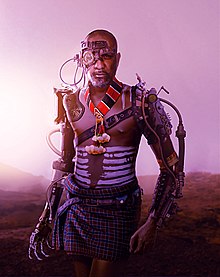cyborg
Jump to navigation
Jump to search
See also: Cyborg
English
[edit]Etymology
[edit]Blend of cybernetic + organism. Coined by Austrian neuroscientist Manfred Clynes in 1960.[1]
Pronunciation
[edit]- (UK) IPA(key): /ˈsaɪ.bɔː(ɹ)ɡ/
- (General American) IPA(key): /ˈsaɪ.boɹɡ/, [ˈsaɪ.bo̞ɹɡ]
Audio (US): (file)
Noun
[edit]cyborg (plural cyborgs)
- (science fiction) A being which is part machine and part organic.
- 1981, Teri (Pettit at PARC-MAXC), fa.sf-lovers newsgroup, "Re: SF-LOVERS Digest V3 #122", May 15:
- I would not classify the Tin Woodman as magical robot, but more of a magical cyborg, if anything.
- 1991, Timothy K. Smith, "Manfred Clynes Sees A Pattern in Love -- He's Got the Printouts", The Wall Street Journal, September 24, front page:
- Prof. Clynes is a published poet and author of five books. He coined the word "cyborg". He also coined the word "sentics" to describe a new science entirely of his own devising.
- 2002 September 19, “Short Cuts”, in London Review of Books, volume 24, number 18, Thomas Jones:
- ... Kevin Warwick, professor of cybernetics at Reading University. Warwick is no stranger to publicity. His autobiography, I, Cyborg, which came out last month (Century, £16.99), meticulously catalogues his very many newspaper, magazine, radio and TV appearances. With commendable honesty, he also acknowledges the amount of (unfair, obviously) criticism he has received for being greedy for media attention. That isn't the main thrust of the book, though, which is rather an account of why he is turning himself into a cyborg.
- 2003, David Simpson, "Are we still tragic?", guardian.co.uk (exclusive from London Review of Books Vol. 25 No. 7, April 3), April 1:
- The cyborg subject, with its pacemakers, drug regimes and artificial limbs, is usually also the first world middle to upper-class economic subject with a conscious incentive to preserve life for as long as possible under the best possible conditions.
- 2003 July 14, Anthony Lane, “The Current Cinema -- Metal Guru”, in The New Yorker:
- On the track of John and Kate is the T-X (Kristanna Loken), a blond female cyborg so metallically single-minded, and so impervious to blandishment and punishment alike, that, from where I was sitting, she looked to be our best hope of getting a woman into the Oval Office.
- 1981, Teri (Pettit at PARC-MAXC), fa.sf-lovers newsgroup, "Re: SF-LOVERS Digest V3 #122", May 15:
- A human, animal or other being with electronic or bionic prostheses.
Synonyms
[edit]Derived terms
[edit]Related terms
[edit]Translations
[edit]person who is part machine
|
Verb
[edit]cyborg (third-person singular simple present cyborgs, present participle cyborging, simple past and past participle cyborged)
- (science fiction) To convert (something) into a cyborg.
- Synonym: cyborgize
References
[edit]- ^ Manfred E. Clynes, Nathan S. Kline (1960 September) “Cyborgs and space”, in Astronautics[1]:
- For the exogenously extended organizational complex functioning as an integrated homeostatic system unconsciously, we propose the term “Cyborg.” The Cyborg deliberately incorporates exogenous components extending the self-regulatory control function of the organism in order to adapt it to new environments. […] The purpose of the Cyborg, as well as his own homeostatic systems, is to provide an organizational system in which such robot-like problems are taken care of automatically and unconsciously, leaving man free to explore, to create, to think, and to feel.
- Jesse Sheidlower, editor (2001–2024), “cyborg, v.”, in Historical Dictionary of Science Fiction.
Further reading
[edit]Italian
[edit]Etymology
[edit]Unadapted borrowing from English cyborg.
Noun
[edit]cyborg m
Polish
[edit]
Etymology
[edit]Orthographic borrowing from English cyborg.
Pronunciation
[edit]Noun
[edit]cyborg m animal
- (robotics, science fiction) cyborg (being which is part machine and part organic)
- Hypernym: robot
Declension
[edit]Declension of cyborg
Noun
[edit]cyborg m pers
- (colloquial, figurative) person resistant to prolonged exertion or not feeling emotions, thus resembling a cyborg
Declension
[edit]Declension of cyborg
Derived terms
[edit]noun
Further reading
[edit]- cyborg in Wielki słownik języka polskiego, Instytut Języka Polskiego PAN
- cyborg in Polish dictionaries at PWN
Romanian
[edit]Etymology
[edit]Unadapted borrowing from English cyborg.
Pronunciation
[edit]Noun
[edit]cyborg m (plural cyborgi)
Declension
[edit]Declension of cyborg
| singular | plural | |||
|---|---|---|---|---|
| indefinite articulation | definite articulation | indefinite articulation | definite articulation | |
| nominative/accusative | (un) cyborg | cyborgul | (niște) cyborgi | cyborgii |
| genitive/dative | (unui) cyborg | cyborgului | (unor) cyborgi | cyborgilor |
| vocative | cyborgule | cyborgilor | ||
Spanish
[edit]Pronunciation
[edit]- IPA(key): (Spain) /θiˈboɾɡ/ [θiˈβ̞oɾɣ̞]
- IPA(key): (Latin America, Philippines) /siˈboɾɡ/ [siˈβ̞oɾɣ̞]
- Rhymes: -oɾɡ
- Syllabification: cy‧borg
Noun
[edit]cyborg m (plural cyborgs)
Categories:
- English blends
- English coinages
- English 2-syllable words
- English terms with IPA pronunciation
- English terms with audio pronunciation
- English lemmas
- English nouns
- English countable nouns
- en:Science fiction
- English terms with quotations
- English verbs
- en:Cybernetics
- en:People
- en:Stock characters
- en:Transhumanism
- Italian terms borrowed from English
- Italian unadapted borrowings from English
- Italian terms derived from English
- Italian lemmas
- Italian nouns
- Italian terms spelled with Y
- Italian masculine nouns
- it:Science fiction
- Polish terms borrowed from English
- Polish orthographic borrowings from English
- Polish terms derived from English
- Polish 2-syllable words
- Polish terms with IPA pronunciation
- Polish terms with audio pronunciation
- Rhymes:Polish/ɘbɔrk
- Rhymes:Polish/ɘbɔrk/2 syllables
- Polish lemmas
- Polish nouns
- Polish masculine nouns
- Polish animal nouns
- pl:Robotics
- pl:Science fiction
- Polish personal nouns
- Polish colloquialisms
- pl:People
- Romanian terms borrowed from English
- Romanian unadapted borrowings from English
- Romanian terms derived from English
- Romanian terms with IPA pronunciation
- Romanian lemmas
- Romanian nouns
- Romanian countable nouns
- Romanian terms spelled with Y
- Romanian masculine nouns
- Spanish 2-syllable words
- Spanish terms with IPA pronunciation
- Rhymes:Spanish/oɾɡ
- Rhymes:Spanish/oɾɡ/2 syllables
- Spanish lemmas
- Spanish nouns
- Spanish countable nouns
- Spanish masculine nouns
- es:Science fiction
